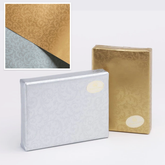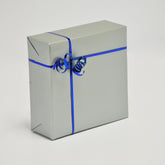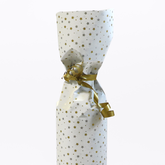Why Ribbon is now being made Biodegradable

Ribbon is an attractive and popular element of traditional gift wrapping, with strong connotations of thoughtfulness and attention to detail. However, among many consumers, ribbon has fallen out of fashion due to its dubious sustainability credentials.
Most traditional ribbons used in packaging are made from printed fabric or synthetics, often with foil or metallic overlays, or plastic coatings to increase their durability. Although these ribbons look nice and have the strength to hold gift products in place, they are, sadly, not recyclable. Many traditional ribbons exhibit a stubborn resistance to decomposition, too, with some taking over a century to degrade completely in landfill.
How do brands approach this conundrum? Is the right thing to do simply to ditch the ribbon in gift packaging?
Not necessarily.
Most brands and consumers agree that gift ribbon should not be made from non-biodegradable materials, which has a negative impact on the environment. Therefore, with the growing shift toward greater sustainability in packaging, many manufacturers are now making the conscious choice to switch to biodegradable ribbons.
What are biodegradable ribbons?
Biodegradable ribbons are made from a variety of natural materials that are designed to break down over time without harming the environment. Some commonly used substrates include recycled paper, cotton, raffia, and other plant-derived fibres. A biodegradable ribbon will also be coloured using natural and non-solvent-based dyes, further reducing their environmental impact. Sustainable ribbons can be used to replace traditional ribbons like for like in a wide variety of applications, including gift wrapping and product packaging.
What ribbons to avoid
As a rule of thumb, ribbons to avoid are any that are derived from synthetic petrochemical materials or treated fabrics. This isn’t true for all synthetics, however – some satin ribbon, for instance, is made from recycled polyester and can be recycled once the consumer has finished with it.
The best way to be sure is to request full sustainability information from your ribbon supplier, including the materials used, whether the ribbon can be recycled, and if the product is biodegradable. You can then provide this information to your consumers to enable them to make conscious eco-friendly decisions when purchasing gift products.
Customised sustainable ribbons
Transitioning to biodegradable ribbons does not limit your choices for branding. At Kudos Giftwrap, we offer custom bespoke printed ribbons in a variety of materials that can be fully personalised to your brand identity. When selecting a biodegradable ribbon, you’ll be able to specify the colour and style to meet the needs of your customers, with the confidence that the ribbons are compostable and biodegradable, and do not contain any harmful solvents.
What else can you do?
As well as making it easy for customers to recycle your ribbons and ensuring that they biodegrade effectively if thrown away, you can also encourage re-use. Many custom ribbons are beautiful items that can easily be repurposed again in gift packaging, or even craft items within the home. By informing customers about the ways in which your ribbons and product packaging can be reused, you can extend the life of the material and help unlock its creative potential.
Custom decorative ribbons from Kudos Giftwrap
To find out more about biodegradable ribbons and how they can support your brand commitment to sustainability, please contact Kudos today on 01923 947513.






